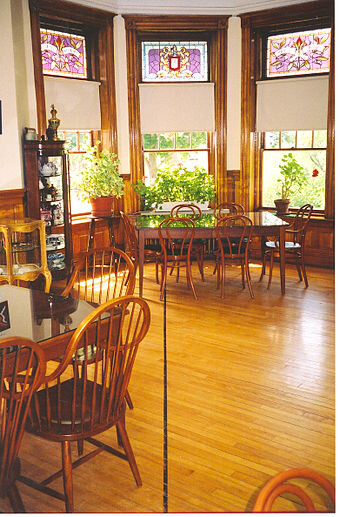
Jim Hightower: So wall off the Canadian border, too!?
A plaque attached to a bridge on the Maine /New Brunswick border crossing.
— Photo by Marty Aligata
The Haskell Free Library and Opera House straddles the border in Derby Line, Vt., and Stanstead, Quebec. The line on the floor shows the boundary line.
Looking at Campobello Island, in New Brunswick, Canada. Its only land access to the mainland is to Maine.
Park in Pittsburg, N.H., which is on the Canadian border. See New York Times story linked below.
— Photo by Jon Platek
Text from OtherWords.org
In the 1980s, many Texans were alarmed that hordes of immigrants were fleeing Rust Belt states and pouring across the Red River to take our jobs. So my friend and fellow Texan Steve Fromholz recommended a big beautiful wall across our northern border to keep them out.
Fromholz, a popular singer-songwriter and renowned political sprite, was ahead of his time in the political sport of wall building.
Instead of steel barriers and miles of nasty razor wire, Steve proposed preventing Yankee refugees from entering the Lone Star State by planting a 10-foot high, 10-foot thick wall of jalapeño peppers along the length of the Red River. Eat your way through and you’d be accepted as a naturalized Texan.
I thought of Steve’s impishness when I read that Nikki Haley, Ron DeSantis, and other Republicans were concocting a whole new xenophobic bugaboo to goose up their anti-immigrant demagoguery.
We can’t just fear the “invasion” coming across our Southern border, they cry! Indeed, Haley wailed: “It’s the northern border, too.” She added ominously that we must “do whatever it takes to keep people out.” DeSantis piled on, saying we should wall off America’s Canadian border.
Meanwhile, nearly all residents living along that 5,500-mile boundary fear the political wall-mongers more than the imaginary threat of foreigners surging across illegally. “People have always been coming through Canada,” says a clerk at a general store in far-north New Hampshire. Scoffing at the silly political hype, she says: “I don’t think the residents are really worried.”
But Chicken Little politicos won’t be shooed off by reality. After all, they still have the east, west and Gulf coasts to shut off — so expect them to propose razor wire for the entire U.S. shoreline. Their ridiculousness makes Fromholz’s satire seem rational!
OtherWords columnist Jim Hightower is a radio commentator, writer and public speaker.
Phil Galewitz: Vt., N.H. and Maine are pushing to import Canadian drugs
The Haskell Free Library and Opera House straddles the border in Derby Line, Vt., and Stanstead, Quebec. The dark line shows the exact border.
Vermont, New Hampshire and Maine, all bordering on Canada, as well as Florida and Colorado, are moving ahead with efforts to import prescription drugs from Canada, a politically popular strategy greenlighted last year by then-President Trump.
But it’s unclear whether the Biden administration will proceed with Trump’s plan for states and the federal government to help Americans obtain lower-priced medications from Canada.
During the presidential campaign, Joe Biden expressed support for the concept, strongly opposed by the American pharmaceutical industry. Drugmakers argue it would undercut efforts to keep their medicines safe.
The Pharmaceutical Research and Manufacturers of America, an industry trade group, filed suit in federal court in Washington, D.C., to stop the drug-purchasing initiatives in November. That followed the Trump administration’s final rule, issued in September, that cleared the way for states to seek federal approval for their importation programs.
Friday was the deadline for the government to respond to the suit, which could give the Biden administration a first opportunity to show where it stands on the issue. But the administration could also seek an extension from the court.
Meanwhile, Florida and Colorado are moving to outsource their drug importation plans to private companies.
Florida hired LifeScience Logistics, which stores prescription drugs in warehouses in Maryland, Texas and Indiana. The state is paying the Dallas company as much as $39 million over 2½ years, according to the contract. That does not include the price of the drugs Florida is buying.
LifeScience officials declined to comment.
Florida’s agreement with LifeScience came last fall, just weeks after the state received no bids on a $30 million contract for the job.
Florida’s importation plan calls initially for the purchase of drugs for state agencies, including the Medicaid program and the corrections and health departments. Officials say the plan could save the state in its first year between $80 million and $150 million. Florida’s Medicaid budget exceeds $28 billion, with the federal government picking up about 62% of the cost.
On Monday, the Colorado Department of Health Care Policy and Financing issued a request for companies to bid on its plan to import drugs from Canada. Unlike Florida’s plan, Colorado’s would help individuals buy the medicines at their local pharmacy. Colorado also would give health insurance plans the option to include imported drugs in their benefit designs.
Kim Bimestefer, executive director of Colorado’s Health Care Policy and Financing agency, said she is hopeful the Biden administration will allow importation plans to proceed. “We are optimistic,” she said.
Her agency’s analysis shows Colorado consumers can save an average of 61% off the price of many medications imported from Canada, she added.
Prices are cheaper north of the border because Canada limits how much drugmakers can charge for medicines. The United States lets the free market determine drug prices.
The Canadian government has said it would not allow the exportation of prescription drugs that would create or exacerbate a drug shortage. Bimestefer said that her agency has spoken to officials at the Canadian consulate in Denver and that officials there are mainly concerned about shortages of generic drugs rather than brand-name drugs, which is what her state is most interested in importing since they are among the most costly medicines in the U.S.
Colorado plans to choose a private company in Canada to export medications as well as a U.S. importer. It hopes to have a program in operation by mid-2022.
But skeptics say getting the programs off the ground is a long shot. They note that Congress in 2003 passed a law to allow certain drugs to be imported from Canada — but only if the secretary of the Department of Health and Human Services agreed it could be done safely. HHS secretaries under Presidents George W. Bush and Barack Obama refused to do that. But HHS Secretary Alex Azar gave the approval in September.
Biden’s HHS nominee, Xavier Becerra, voted for the 2003 Canadian drug-importation law when he was a member of Congress.
HHS referred questions on the issue to the White House, which did not return calls for comment.
Trish Riley, executive director of the National Academy for State Health Policy, said that states have worked hard to set up procedures to ensure drugs coming from Canada are as safe as those typically sold at local pharmacies. She noted that many drugs sold in the United States are already made overseas.
She said the Biden administration could choose not to defend the importation rule in the PhRMA court case or ask for an extension to reply to the lawsuit. “Right now, it’s murky,” she said of figuring out what the Biden team will do.
Ian Spatz, a senior adviser with consulting firm Manatt Health, questions how significant the savings could be under the plan, largely because of the hefty cost of setting up a program and running it over the objections of the pharmaceutical industry.
Another obstacle is that some of the highest-priced drugs, such as insulin and other injectables, are excluded from drug importation. Spatz also doubts whether ongoing safety issues can be resolved to satisfy the new administration.
“The Trump administration plan was merely to consider applications from states and that it was open for business,” he said. “Whether [HHS] will approve any applications in the current environment is highly uncertain.”
Phil Galewitz is a Kaiser Health News journalist.
Phil Galewitz: pgalewitz@kff.org, @philgalewitz
Trade deal called great for New England
“The House’s vote to approve the United States-Mexico-Canada Agreement (USMCA) is a huge win for the New England economy. With over 600,000 jobs in our region supported by trade with Canada and Mexico, and nearly $13 billion in exports in 2018 alone, the importance of this agreement for our region’s continued growth and prosperity cannot be understated. Beyond the numbers, the USMCA makes important updates to modernize our trade relationship with these key partners to take into account modern day technology and innovation. From provisions to allow for cross-border data flow, to clear guidance on data localization, to protections for intellectual property, this is truly a 21st Century trade deal and hopefully a template for future free trade agreements.”
“The New England Council has a long history of support for free trade, and approval of the USMCA has been a top legislative priority for the organization in 2019. The council has written to members of the region’s congressional delegation and published op-eds in regional publications expressing its support for the agreement and outlining its impact on the region, and has brought members representing an array of industries to meet with policymakers on Capitol Hill to advocate for the multi-lateral agreement, which updates the 25-year-old North American Free Trade Agreement (NAFTA)..
The Haskell Free Library and Opera House straddles the international border (note the line in the floor) in Rock Island, Quebec, and Derby Line, Vt. The Opera House opened on June 7, 1904, and was deliberately built on the border between Canada and the United States as a sign of friendship.
Ease Canada Border Crossings, Please
From Robert Whitcomb’s “Digital Diary’’ in GoLocal24.com
The new U.S.-Mexico-Canada Trade Agreement, which has won bipartisan support in Washington, may well be an improvement over NAFTA. But it will take a couple of years to know how well it’s working out for our economy. Still, I wish something could be done to make it faster and easier to cross the U.S.-Canadian border, which has become so much more awkward since 9/11. It used to be almost as easy as crossing from Vermont into New Hampshire. Things are far more fraught these days but I think that only a modest increase in U.S. and Canadian border officers would result in much faster crossings.
A U.S. Border Patrol officer patrols the North Woods along the Canadian border.









